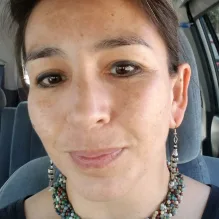Kat Milligan-McClellan
Principal Investigator
Dr. Kat has broad expertise in microbiology, including both pathogenic and symbiotic microbes. As an undergrad and as a lab technician, she helped describe environmental and genetic factors that regulate toxin production in Staphylococcus aureus. For her PhD thesis she identified and characterized genes and their products necessary for an obligate intracellular parasite, Toxoplasma gondii, to establish infections in host brains. She expanded her exploration of host-microbe interactions during her postdoctoral training at the University of Oregon, where, working with a team of talented research associates, undergraduate students, and fellow postdoctoral fellows, she established stickleback as a model to examine how host genetic background contributes to host immune responses to intestinal microbiota. She was trained in host immune response to microbes, and examined how the host genetic background contributes to the ability of the host to shape the intestinal microbiota. During these studies, she built collaborations across two institutions and three universities, and mentored ten undergraduate and graduate students.
Dr. Kat’s long term mentoring goal is to combine the experiences she had as an Inupiaq earning a PhD and the expertise she gained in multiple research fields into a flourishing career as a mentor and professor to microbiologists. Kat was raised in a remote community above the Arctic Circle that was 80% Alaskan Native. She was the first person in her village to earn a PhD in biological sciences. While in school, she was struck by the scarcity of females and minorities in science. As a result, she is committed to making the academic research field a welcoming environment for minorities.
Dr. Kat is an active member in both scientific and Native communities. She taught Alaskan Native games to students and community members at the University of Wisconsin-Madison and the University of Oregon. At UW-Madison she was active in the American Indian Science and Engineering Society (AISES) and Wunk Sheek. At UO she was active in the Native American Strategies group, a group of faculty, staff and students that shaped Indigenous issues on campus. She worked extensively with the Diversity Director and the UO Native American community, staff, students and faculty to develop a new program for recruiting Alaska Natives and Native Americans (AN/NA) into science (Alaska Oregon Research Training Alliance, AORTA). She collaborated with Lane Community College in Eugene, Oregon to support an intense college preparation summer program (Bridge of the Gods Summer Academy, BOGSA). As an instructor for BOSGA, she taught Native American high school students Introduction to Microbiology for two weeks every summer to prepare them for the rigors of college and to show them that they can be successful in science classes. Dr. Kat continued to build relationships between the University of Oregon and the University of Alaska Anchorage, and between the UAA and the Alaskan Native/Native American community to recruit and support AN/NA students in science, technology, engineering and mathematical fields through ANSEP, Della Keats Health Sciences Summer Program, and UAA STEM day. Dr. Kat joined UConn in the midst of the pandemic, which has affected her ability to do outreach. However, she is active in the Native community on campus. She teaches a class on Historically Excluded and Underrepresented Scientists in the fall and Host Associated Microbes in the spring.
Dr. Kat’s Researchgate
Dr. Kat on twitter: @napaaqtuk
